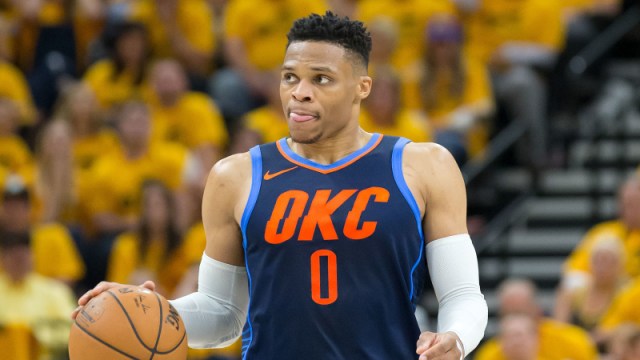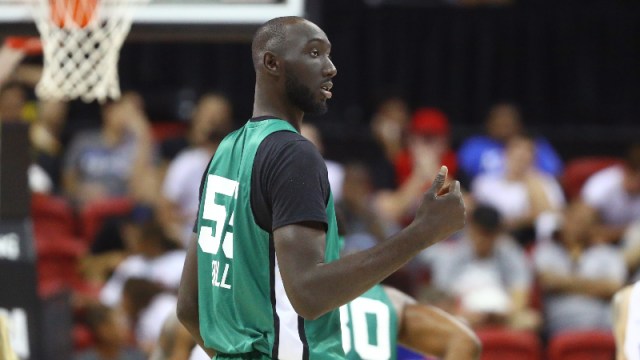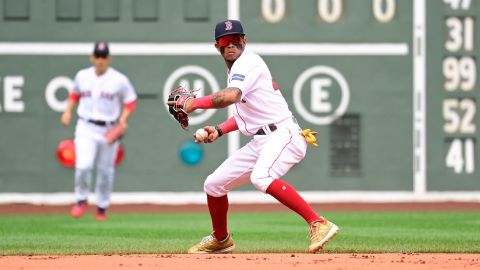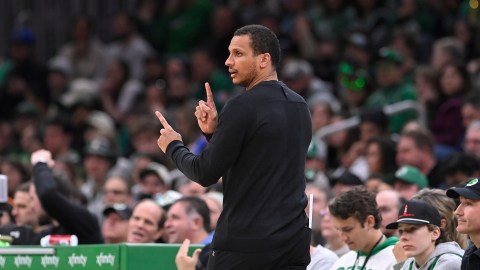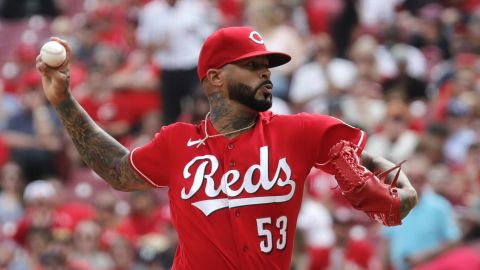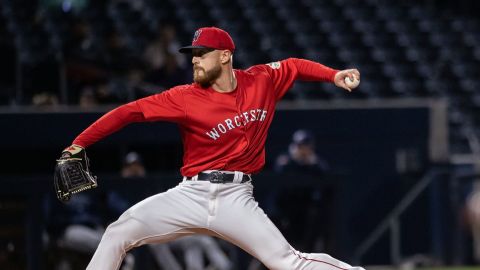Editor’s note: Most of the quotes from this story come from NESN’s “Rewind to 99,” a retrospective look at the 1999 All-Star Game at Fenway Park. Click here for a full schedule of airings and learn when you can see the entire show only on NESN.
Pedro Martinez got an appreciated wakeup call in the form of four ear-piercing F-14 jets screaming over Fenway Park.
The Boston Red Sox ace was named the American League starter for the 1999 All-Star Game and was preparing himself to face off against one of the most powerful assembled lineups in baseball history. Serving as sonic smelling salts, the powerful, booming sound of the four jets buzzing the Fenway light towers in a pregame flyover following Donna Summer’s national anthem got Martinez ready for the task.
“I paced myself until the anthem actually was done,” Martinez recently told Tom Caron on NESN’s “Rewind to 99” special. “That’s when the planes passed by and the noise made me shake, and it was like ‘Wake up, Pedro! You’re going to the All-Star Game!'”
Not everyone reacted the same, though.
“I almost fell to the ground. They scared the daylight out of me,” Larry Walker told reporters that night.
Martinez ultimately became the star of the show, but he was forced to share the stage with a host of baseball legends. A pregame celebration of the All-Century team gave way to the anthem and flyover, which set the table for Red Sox great Ted Williams. The Splendid Splinter was honored at the middle of the field in a ceremony that went off-script as players from both teams met with Williams, who was especially gregarious when it came to talking shop.
Martinez meanwhile finished his preparations and readied himself for the biggest moment of his baseball life. At the peak of his powers in 1999, Martinez — well on his way to a second career Cy Young Award — didn’t really need any help, but the lingering social scene on his mound might have helped his cause.
“Maybe it was that the players weren’t ready to start the game. They were so caught up in Ted Williams and all of that, that I caught them by surprise. But I did feel responsible for Boston and my performance in my own field and representing Ted Williams,” Martinez said.
What follows is a near pitch-by-pitch breakdown from Martinez himself focusing on his unforgettable performance that night where, over the course of two innings, he struck out five of six batters he faced. Two of those players are Hall of Famers (a third could be on the way), and they all combined for four MVP awards, 25 Silver Sluggers and 45 All-Star Game selections. Throughout the course of their career, they would combine to hit 2,600 home runs.
Here’s how it went down (quotes from Martinez’s conversation with TC are in italics).
FIRST INNING
BARRY LARKIN (.312 batting average, .837 OPS at break)
National League manager Bruce Bochy tasked Larkin with the unenviable task of being the first to climb in and square off with Martinez.
“I didn’t appreciate leading off, but I had to do it,” Larkin said at the time.
Martinez settled in with a pair of fastballs in the mid-90s, getting Larkin to swing through one of them. An 85 mph changeup followed, catching Larkin way out in front. He then dotted a 95 mph fastball on the black for strike two before Larkin battled. The Cincinnati Reds shortstop spent the first half affirming his reputation as one of baseball’s toughest outs, and of the 157 qualified hitters at the break, only 10 struck out at lesser rate than Larkin.
“I started noticing he was hitting foul balls to the right side even though he knew fastball was coming. Fastball was coming, fouled off to the right. I’ve always said to the pitchers, if it’s not broken, don’t fix it. They show you what they can do with you. The ball should lead you. If you’re throwing fastball, and he knows fastball is coming, and the fastball is still beating him, there’s no need to change. Fouled off again to the right side. … He’s just spoiling pitches. That’s probably where I pulled the spring and decided toward the end, I knew I couldn’t just put him away with a fastball and that’s when I threw the changeup.”
Larkin whiffed, nearly spinning himself into the ground for the first out of the inning.
LARRY WALKER (.382, 25 home runs, 77 RBI, 1.118 OPS)
Martinez made quick work of his former Montreal Expos teammate, striking him out on four pitches, putting away the 1997 NL MVP on a 97 mph heater on the outside corner.
“I got him seeing the changeup and I sped him up. I went fastball up. He chased, and now he’s caught in between. What is it? Is it a fastball? Is it a changeup? I have pinpoint control and very good command … After that, he’s probably thinking ‘Well, he threw me a changeup and two fastballs — here comes a changeup.’ No. It was another fastball.”
The bamboozled Walker couldn’t believe how good Martinez was throwing.
“(Walker) looked at me like, ‘What are you doing? You weren’t that good when I last saw you,'”
“Pedro, were you throwing 400 miles an hour out there?” Walker asked Martinez after the game.
SAMMY SOSA (32 home runs, 74 RBI)
The Dominican natives weren’t going to take it easy on each other.
“This is bragging rights. Sammy did not want to negotiate that, and I wasn’t willing to also kind of give him the bragging rights. I knew Sammy. He saw a lot of fastballs and a lot of changeups, but no breaking balls. So I started him off with a breaking ball, just so he knows I have one.”
Sosa actually saw two breaking balls, bailing on consecutive curveballs.
“When I looked at the way he took it, well I might as well repeat that, and he (again) took it a bad way as well. So I decided to just go there and see what he was thinking. He buckled — a couple of times.”
Martinez then showed Sosa a 96 mph fastball up out of the zone.
“Now he’s caught in between. What is it? ‘He threw me two breaking balls, now a fastball,’ and he’s aware of the changeup and he swings at the changeup. He didn’t expect it to be such a good changeup. Once I saw Sammy swing at the changeup, and now I said ‘OK, now it’s time for me to elevate.’
A 96 mph fastball ran in on Sosa’s hands. He swung, he missed, and that was that. The side was down on strikes.
SECOND INNING
The American League jumped on Curt Schilling for a pair of runs in the bottom of the first to spot Martinez a 2-0 lead after one. Waiting for him in the top of the second was Mark McGwire, one year after setting the single-season home run record of 70 in 1998 and one night after putting on a legendary show in the Home Run Derby.
MARK McGWIRE (28 home runs, 72 RBI, 1.027 OPS)
Martinez toyed with McGwire, showing him a looping curveball off the plate to start the at-bat before tightening things up with a knee-buckling curveball and an unhittable changeup to run the count to 1-2.
“When you know that when you have three pitches, and you can command all three of them, they have to commit to just one of them.”
Then, a 97 mph fastball at the belt for the swinging strikeout. Looking back, Martinez couldn’t help but laugh.
“It’s hard to believe that a guy who loved the fastball as much as McGwire could get caught in between, but that’s what you did. If you have three pitches, you have to get the hitter to commit to just one and give you the advantage of having two. When you look changeup, and I have 97, you’ve got no chance on the fastball. If you’re looking fastball, and I have a breaking ball — and a changeup — and you’re looking for fastball, you have little chance to make contact, unless I make a mistake, on one of those two.”
“Thank God that you don’t have to face him,” McGwire told Martinez’s Red Sox teammate, Nomar Garciaparra, after the game.
MATT WILLIAMS (.318, 23 home runs, 82 RBI)
Williams was the smartest of the bunch, swinging at the first pitch and grounding one to second baseman Roberto Alomar. The sure-handed second baseman surprisingly booted it, and Williams was aboard.
“He did not want to wait to get deep in the count, so he jumped right up at the first breaking ball he saw. That’s a guy I did really well against. I did really well against him, but he just wanted to get something in the strike zone, something I was known to do very quick the entire season.”
JEFF BAGWELL (.315, 28 home runs, 78 RBI)
With the runner aboard, Martinez wanted to help catcher Ivan Rodriguez keep Williams close at first and went to the slide step.
“This is where Baggy gets confused. Baggy doesn’t know what’s coming, and I was really good at holding the runners, so here we go.”
The first pitch was clearly outside, but home plate umpire Tim Evans showed he might have been caught up in the show and called it a strike.
“I got away with that one. That was a fastball that looked to be away, but I was so on top of the game that (shrugs), the umpire got caught up into that.”
The rest of the at-bat was focused not just on getting out Bagwell but keeping Williams close at first.
“I’m also helping Pudge (Rodriguez). Pudge is calling for everything middle-away, so he can have a good open field to throw to second. … I got him everything away, everything away on Baggy. Because I just didn’t think from that crouch he was going to be able to come up and get it.”
Bagwell accomplished a minor miracle running the count full before unsuccessfully swatting at an unfair 83 mph changeup. Williams was running, and that bad idea was extinguished by the 13-time Gold Glove-winning Rodriguez, who threw out Williams to complete the double play and end Martinez’s magical performance.
“We kept him so close, and that (snap) throw to first got Matt Williams’ attention. So when he took off, we had him by far. You have to give Pudge so much credit. He was the best at throwing to second I ever saw.”
The AL won the game 4-1 with Martinez picking up the win and being named MVP.
“I was actually in the parking lot when the game was over, and I was told, ‘No, you need to come back. I think you are the MVP.’ I was ready to go home. I wasn’t really thinking about awards or whatever. I was just, I knew I did what I did for Boston.”
DESERVED HONOR
That was only part of the honors for Martinez, who owned the night and further established himself as a baseball legend in the process.
“I was relaxed. I was so happy to also have the opportunity to exchange. Having Randy Johnson come over and say ‘I want to exchange jerseys,’ it was like so cool.
Doing it all in front of the All-Century team — literally the best players to ever play the sport — only made the experience sweeter for the ultra-competitive Martinez.
“It was a great joy to have that opportunity and then in front of the All-Century players, I thought these guys are going to get the right impression about a true big leaguer. I didn’t want to look any shorter than they are. The century players got a show to watch, and since they were old, they were watching. I really wanted to look good for them.f
“I finally got the sense that I belonged and that I could do anything any of those guys did. Not only was I told by Ted Williams ‘You are one of the best I’ve ever seen, you’re one helluva pitcher,’ and Hank Aaron told me I knew you were good, but now I know you’re so special.’ To me, that was a confidence booster that never left my soul.”
A SPECIAL MEETING
But Martinez’s biggest honor came later that night high above Fenway Park in a luxury suite where he got a chance to spend some time with Williams, their conversation alternating between English and Spanish.
“You are a helluva pitcher,” Williams told an awestruck Martinez. “I love the way you pitch. I’m not kidding you.”
A humbled Martinez eventually replied, “Oh my God, this is a great honor.”
Williams signed a program for Martinez, a souvenir that holds even more significance for Martinez than his MVP trophy.
“The other trophy, yeah I have it at home, I can display it any time, but the fact that Ted Williams acknowledged me as one of those players and I probably belonged with the All-Century players meant more than the actual trophy and what I did in the All-Star Game. Just recognizing me as one of the big league players he thought were at his level … It made me feel like I could take on anything.”
The 1999 All-Star Game signaled to his contemporaries that there was no one better than Martinez, and to his predecessors, it proved he belonged alongside them — 16 years before he’d join them in Cooperstown.
“It was like having a hundred grandpas proud of you coming to see what they taught you to do. They were the ones that taught every one of us how to do it right. For me to be out there representing baseball and representing them on their day, it was something that, thinking deeper, was bigger than people think.”

